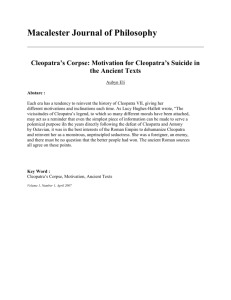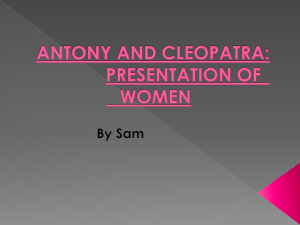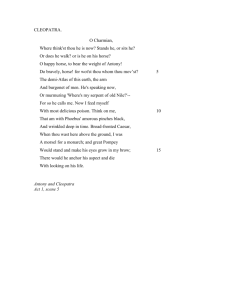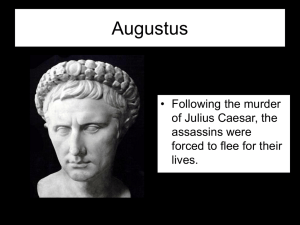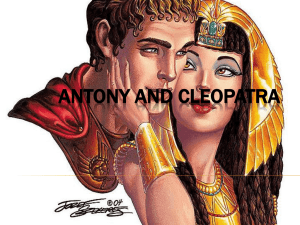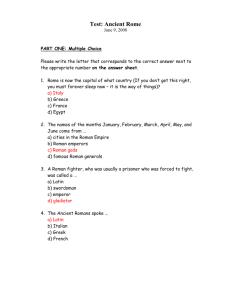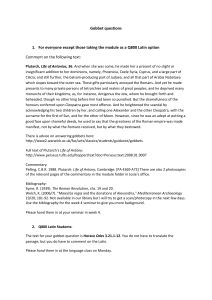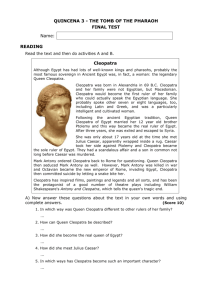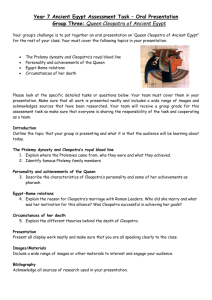PH: Good evening, good evening
advertisement
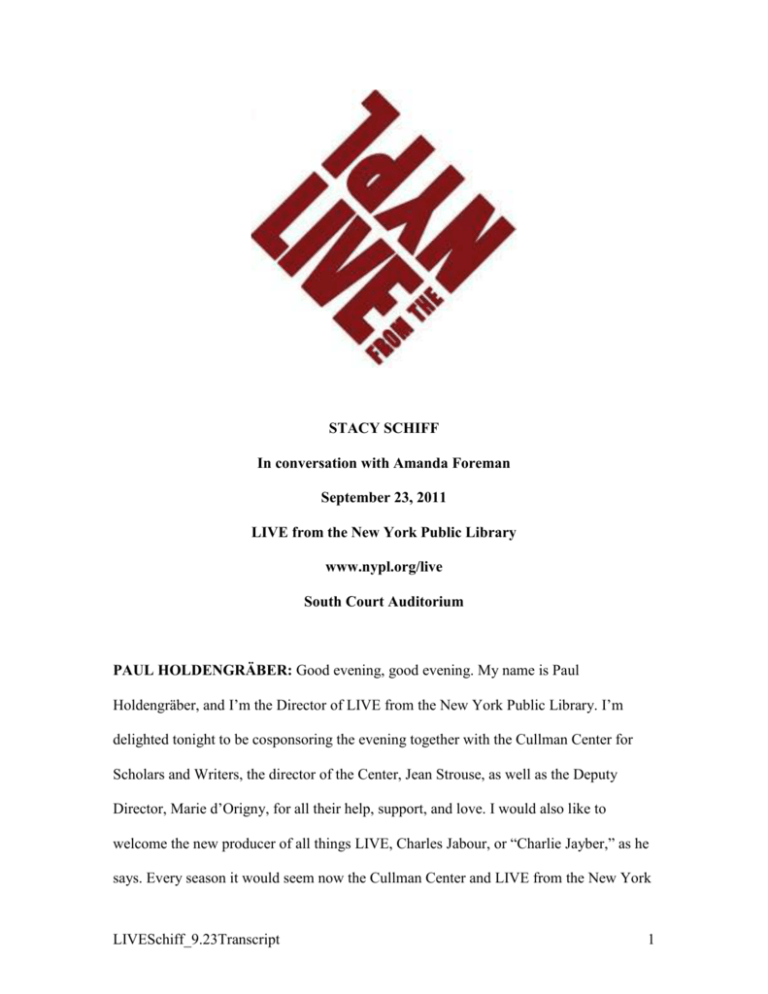
STACY SCHIFF In conversation with Amanda Foreman September 23, 2011 LIVE from the New York Public Library www.nypl.org/live South Court Auditorium PAUL HOLDENGRÄBER: Good evening, good evening. My name is Paul Holdengräber, and I’m the Director of LIVE from the New York Public Library. I’m delighted tonight to be cosponsoring the evening together with the Cullman Center for Scholars and Writers, the director of the Center, Jean Strouse, as well as the Deputy Director, Marie d’Origny, for all their help, support, and love. I would also like to welcome the new producer of all things LIVE, Charles Jabour, or “Charlie Jayber,” as he says. Every season it would seem now the Cullman Center and LIVE from the New York LIVESchiff_9.23Transcript 1 Public Library present one or two events together. This fall, and thank you for coming tonight, we also will be welcoming on October 11th, John Lithgow, who will be in conversation with Bill Moyers. This fall, also, LIVE will be presenting evenings with Ariel Dorfman, this Monday, next Friday, Robert Wilson together with Lucinda Childs, Rufus Wainwright, and Lou Reed. Later this season I will be talking to Harry Belafonte, Rick Rubin with Russell Simmons, Gilberto Gil, Jessye Norman, Brian Eno, and Anish Kapoor, to mention a few. So I hope you will be able to come. Come, join the mailing list, and you will find all of the programs on your seat if you are interested. It is a pleasure to welcome tonight Amanda Foreman, the author of Georgina, Duchess of Devonshire, adapted to the screen as The Duchess and most recently A World on Fire: Britain’s Crucial Role in the American Civil War. She will be in conversation with Pulitzer Prize–winning author Stacy Schiff, the author of Saint-Exupéry, of A Great Improvisation: France, Franklin, and the Birth of America. And of course of Cleopatra: A Life, which is a source of a movie slated to star, I’m told, Angelina Jolie. Stacy was a Cullman Fellow and I would also like to congratulate her on joining Jonathan Franzen, Tony Kushner, Natalie Merchant, Ian McEwan, and Isabel Wilkerson in becoming this November a Library Lion of the New York Public Library. (applause) For the past few years now, we have asked each of the authors, each of the talent, coming here to define themselves in seven words, a biography in seven words, a haiku of sorts. Amanda Foreman: “Scholar, writer, innovator, educator, wife, mother, obsessive.” Stacy LIVESchiff_9.23Transcript 2 Schiff: “Once turned cartwheels in the Reading Room.” Please welcome Amanda Foreman and Stacy Schiff! (applause) AMANDA FOREMAN: I know we’re all absolutely delighted to have Stacy here with us this evening. I know you’ve been doing an awful lot of traveling. STACY SCHIFF: Not at all! AMANDA FOREMAN: And in fact your plane only touched down a few seconds ago. STACY SCHIFF: Absolutely, I’m here directly from the airport, uptown. AMANDA FOREMAN: And you braved the rain to get here, so thank you very much. STACY SCHIFF: Thank you for doing this. AMANDA FOREMAN: It’s a real pleasure, it really is, and also now I get to ask questions that I’ve always wanted to ask. STACY SCHIFF: That’s why I didn’t want you to do this! LIVESchiff_9.23Transcript 3 (laughter) AMANDA FOREMAN: Very well, there we go, no good deed goes unpunished. So my first question to do you is something I think most writers want to know. You started out in publishing, after Williams College, you joined Simon & Schuster and you were there for about eight years. So when did you realize you were on the wrong side of the fence? STACY SCHIFF: The first time I got in an elevator with Dick Snyder. I wasn’t there for eight years, actually, I was at Viking first, just so I don’t forget to mention that. It actually I’ll tell you because it involves this building. As an editor you’re meant to be having lunch most days with agents, which is usually a wonderful thing to do, but somehow I got the idea that there ought to be a new biography of Saint-Exupéry. And I would sneak over to the Reading Room, to the South Reading Room, from Simon & Schuster’s offices and spend my lunch hour reading about Saint-Ex so that I could figure out what author I could pitch this idea to over lunch one day, and I found that increasingly I was spending my afternoons here in the library as opposed having lunch with agents, and that when I did have lunch with agents, I didn’t ever sort of say, “Don’t you have a writer who would like to do this book?” because I was getting very possessive about it, and then there was the day that someone told me that one of those books was actually pseudonymously written by Saint-Exupéry’s lover but under a male pseudonym and I sat there in the Reading Room and piled up all twelve of the previous biographies to try to figure out which one it was and finally I realized it was the one that didn’t mention his marriage. (laughter) And that was when I thought I could possibly add value here. LIVESchiff_9.23Transcript 4 (laughter) AMANDA FOREMAN: So now fourteen years later and four books later, we have Cleopatra, and critics have described it as your most dazzling work, I think for three reasons, three obvious reasons, first of all its artistry, its courage, and its insights into a woman who left behind no papers, no portraits, and no eyewitness accounts that aren’t problematic. You say very pithily in the book that to read a Roman history of Cleopatra would be like reading a history of the United States if it were written by Chairman Mao, (laughter) so I think it’s for the benefit of those who haven’t read your book or know that much about Cleopatra, can you just sum up the basic facts about her? STACY SCHIFF: Sure. The problem in writing about Cleopatra is first of all getting past Shakespeare, Shaw, and Elizabeth Taylor. (laughter) So already it’s a losing battle, but the other piece of the losing battle is our misconception that she is Egyptian when she is in fact Greek. And that’s where the trouble lies; she descends from one of the generals of Alexander the Great. She’s born in 69 B.C., she’ll die in 30 B.C. after being defeated by the man who will go on to be the first Roman emperor, Octavian, later to become Augustus, and as a Greek woman her history falls to a series of Roman men, which is already a problem, all of them writing after her lifetime. We can go into this later if you want, but in terms of the sources, Plutarch is probably for various reasons the least biased source and the most congenial source; he’s also the only one who has anything that vaguely qualifies as eyewitness accounts, which are thrice-told tales, and he is writing LIVESchiff_9.23Transcript 5 about a hundred and fifty years after Cleopatra, a little bit longer, so he’s as far removed from her as we are from Ulysses Grant, and he is probably our best source. So in terms of material, very little remains. There’s not a shred of documentation from her reign, not so much because she is a loser in history as because the humidity in Alexandria destroyed all the material, there is no shred of papyrus that remains. And her palace, insofar as any artifacts go, is either under the city of Alexandria, in which case we will never see it, or in pieces under the harbor of Alexandria, where there is currently an underwater excavation going on. AMANDA FOREMAN: And can you give us a slight skeleton outline of her life? For example, we know that she murdered her siblings to stay in power. What was she doing with Julius Caesar? STACY SCHIFF: Okay, assassination. What was she doing? You were going to answer that one. The two family specialties essentially are assassination and incest. This was one of those dynasties where if you didn’t murder your siblings they would murder you. Or as Plutarch so beautifully puts it, “sibling murder was the kind of thing that happened in the best of families.” (laughter) And it did in hers. Cleopatra obviously is the winner of all of that—all that intersibling rivalry. What is happening at the time that she comes to power is that Rome is essentially gobbling up the Mediterranean. And so if you look at Cleopatra’s story in retrospect, you see that she is dealt essentially a losing hand. Rome is LIVESchiff_9.23Transcript 6 closing in on her when she comes to power. Egypt is surrounded by Roman lands, it’s really the only great power that maintains its autonomy. And it is up to her to somehow make peace with Rome, make some kind of alliance with Rome that will allow her to continue on as an independent ruler. She’s really a client queen, but that will allow her to maintain her hold on the throne. This is made easier by the fact that hers is the richest and most fertile country in the Mediterranean. She is the richest person hands down at the time. And no single Roman wants any other Roman to be in control of Egypt because that would be a huge threat to Rome, so it’s like a hot potato contest about who gets to have Egypt. So they would rather that someone else, in this case a Ptolemaic queen, be in control, but she still has to ingratiate herself with Rome, so that when Caesar’s civil war intersects with Cleopatra’s civil war, she quite brilliantly allies herself with him by essentially convincing him he should back her and not the brother with whom she is battling to run the kingdom and somehow coincidentally nine months later she has his child, which pretty much seals the deal. AMANDA FOREMAN: And then after Caesar she went off with— STACY SCHIFF: She will spend a few years with Caesar. She will actually go to Rome with their mutual child, for reasons which are really unclear to us and somewhat mysterious. It would have been in her best interests to go to Rome, it would not have been in Caesar’s best interests to have Cleopatra in Rome. She’s there when he’s murdered, she leaves quite abruptly, because her life is in danger at this point. She will sit LIVESchiff_9.23Transcript 7 out the Roman civil wars, or the fight for Caesar’s mantle that follows, very deftly, and then she will align herself with Mark Antony, who seems the obvious heir to Caesar’s mantle, and with Mark Antony she will coincidentally have several more children, twins, and then another son all while Mark Antony’s Roman wife is turning out daughter after daughter after daughter. So that was also a smart political move. Antony will account for Cleopatra’s basically restoration of the Ptolemaic empire. He will give her lands so that she essentially will control the entire eastern Mediterranean, from present-day Libya around to Southern Turkey, with a little sliver cut out for Herod. However, the alliance with Mark Antony turns out to be an ill-advised one, and they will be defeated. You don’t want to hear about the Roman civil war, I didn’t want to write about the Roman civil war, they will be defeated ultimately by Octavian, and they will be trapped in Alexandria, where they will—I hate to give away the ending—both commit suicide. How was that? AMANDA FOREMAN: That was perfect, thank you very much. (applause) STACY SCHIFF: I can tweak that, too. (laughter) LIVESchiff_9.23Transcript 8 AMANDA FOREMAN: Have you already? So what is known, as it were, is known. So what was your intent in writing a new biography of Cleopatra? STACY SCHIFF: I don’t know about you, but I tend to go into these things somewhat blessedly open-minded. I mean, I had no particular agenda. There’s a great line in E. B. White where he talks about having strong curiosity and weak affiliations, and I had no—I didn’t go into this thinking I’m going to prove that she was Christ’s grandmother (laughter) —or I didn’t go into this proving—that’s on the Internet. (laughter) I didn’t go into this wanting to take a feminist angle on it particularly. I just felt stung by my own ignorance, in fact. I mean, here is a woman we think of as a sexual predator who is in fact an unbelievably well-educated strategic politician. A woman whom we think of as beautiful but who was in fact anything but. A woman whom we think of as Egyptian, who we think is Nefertiti, who had lived thirteen hundred years earlier. Just everything was wrong, and I just thought there was enough peeling away of myth that could be done and if you actually went back to the original sources, you could possibly construct, and I wasn’t sure I could do it as a straight narrative, but I felt I could possibly get an episodic narrative. I think originally I assumed the book would have to be sort of the five known scenes of Cleopatra’s life, the way Joe Ellis had done American Sphinx, where you like leave out the second presidential administration kind of thing, where the stuff we don’t know just wasn’t there. AMANDA FOREMAN: But it does seem that even though there’s a great poverty of firsthand documents about Cleopatra herself, there’s this incredible cornucopia of LIVESchiff_9.23Transcript 9 information about life in Ancient Egypt then and in particular about the status of women and women’s education, and you bring all that out absolutely beautifully in the book, and you compare women’s lives and education and rights in Egypt with those of Rome in which you said women had the same rights as chickens, and I just wonder if you could elaborate a little more on that, because I for one wasn’t aware of quite how different women were treated in the two countries. STACY SCHIFF: Well, you have made the very astute comment yourself about a time and a relationship constituting a biography in your new book, and in a funny way the relationship between Egypt and Rome falls in that category. To understand Cleopatra, which is to say to put her back into context, you have to remember that she is living in a world in which her story will fall to Rome, she is defeated by Rome, and she’s being judged by Roman standards at all times, so and also that everything we know about her comes to us filtered through this Roman sensibility. So, for example, she gets caught up with the whole, a preexisting, if you will, metaphor of the dubious, suspicious, alchemical, occult East, and she is a creature of that world, therefore she is suspect. She is a woman, so she’s suspect, she’s a Greek, so she’s suspect, and she is very, very rich, so the opulence rubs Rome the wrong way, obviously the feminine thing does, and the whole Eastern sensibility thing is a problem. And in fact it wasn’t until I—when she travels to Rome in 46 B.C. and I realized that I had to suddenly paint a picture of her there, that I realized how essential that was going to be, and putting this woman—and taking her out of context, as is always the case when LIVESchiff_9.23Transcript 10 you’re writing history, it is very telling. When I’m writing about Ben Franklin in France, you suddenly begin to see who Ben Franklin really was, because he’s at a disadvantage, he’s in a foreign language, and he’s out of his normal habits, you can actually see the man more clearly. And Cleopatra in Rome was a very different creature. AMANDA FOREMAN: So do you think she—Cleopatra was a product of her education, her background, her milieu, in Egypt, or was she sui generis, a marvel in her own time? STACY SCHIFF: Very much a product of her own—of her own—I mean, of what anyone would have known at the time, and that was one of those points where you suddenly think—I had no childhood for Cleopatra. We have no childhood for any subject from the ancient world, because childhood as we know it doesn’t exist. So for Caesar you have even less of a childhood than you have for Cleopatra. But what we do know, as you mentioned, is how she was educated. And education in Cleopatra’s time anywhere in the Greek world, from Antioch to Athens to Alexandria, would have been absolutely the same, it would be as if being educated in the French system in Martinique or in Alsace today, and the books she had read were the books Caesar had read, so when these two people meet, these two very—these people who were products of very different civilizations, they are coming together as two people who have read and memorized the same lines of Aeschylus, Sophocles, Euripides, especially of Homer, who have been trained in exactly the same way in rhetoric and in how to declaim, in how to deliver a LIVESchiff_9.23Transcript 11 compelling oration, which was usually to entertain and instruct rather than to enlighten. These people—they have exactly the same skills. She would have had the best of that possible education, by virtue of the fact that the best tutors of the day, the best thinkers of the day, were in her backyard in the library and museum in Alexandria, and if you lived in Rome and you wanted a tutor, you sent to Alexandria for one, so these were the elite of the elite. And one thing we know about their education which does differ is that Cleopatra, unlike Caesar, spoke nine language, although again if you put that in context, other eastern Cypriots spoke twenty-three, so nine. AMANDA FOREMAN: She was a slouch, then, clearly. STACY SCHIFF: Obviously. AMANDA FOREMAN: That’s so interesting, because what I think I hear you saying is that both Cleopatra and Caesar, for example, came out of the same educational pea patch, and yet even if they may start on a level playing field in terms of their education, when they become grown-ups they’re judged by very different standards. And one of the things you point out in your book is that women are described as schemers, whereas men are described as strategists. That said, of course, Cleopatra had some quite serious rivals, I mean, Fulvia, Mark Antony’s second wife, was quite a schemer, strategist in her own right. She was the one who started a war in order to try and get Antony back, so she was LIVESchiff_9.23Transcript 12 clearly no slouch. But what would you have described Cleopatra as, as a schemer, or a strategist, or something of both? STACY SCHIFF: Absolutely something of both. I admit that does sound as if I had a bit of an agenda, doesn’t it? Absolutely something of both. There are various moments where when you look at how she reacts to what’s going on around her, you realize she is a woman of really impeccable strategy and one of those is perhaps the moment when Caesar has been murdered, it’s unclear who is going to take over in Rome, to whom she will have to pay tribute next, and she very smartly bides her time. And it’s almost as if a fairy tale. Every Roman who has a claim to Caesar’s legacy comes calling and Cleopatra sort of half steps up to the plate but never entirely until it is clear that it will be Mark Antony. And then when it is Mark Antony, she makes the decision—she lets him summon her several times, first of all, so again she stalls and temporizes and then she makes the decision that you all known from Shakespeare, where she decides she will agree to be summoned and to appear before Mark Antony, but she will do so in a way that indicates to him that she is a queen and queens are not summoned, and she loads her golden vessel with its purple sails up with gifts of all kinds and dresses herself as Aphrodite, arranges herself in a boat surrounded by handmaidens who are dressed as nymphs and strumming on lyres and flutes, distributing clouds of incense along the banks of the river as she makes her way up the river of southern Turkey to Tarsus, a city in the south where Antony has been holding court, and where he will find himself slowly deserted as the LIVESchiff_9.23Transcript 13 entire town empties to go see this vision, this goddess arriving, and the point there does seem to be (a) I don’t answer summonses and (b) I do have this extraordinary fortune that might come in handy for you since you do seem to be planning a military expedition to Parthia. So everything she does does seem to be—and during that moment will entertain Antony in extraordinary style with the knee-deep roses and the lights laced through the treetops and to his military officers she hands out party favors like the goblets which are gemstudded on the table, as well as the table, as well as the horses and the furniture and the Ethiopian slaves who are there that evening so several years later when these officers are called upon to question Cleopatra’s, to pay tribute to Cleopatra’s military genius, they are all of them very happy to vouch for her and to say she’s a tremendously smart tactician. (laughter) AMANDA FOREMAN: So we know that Cleopatra reigned for twenty-one years—is that right?—and so she obviously seemed to be very adept at say, divide and rule, she was very good at dividing her detractors and enemies in order to rule, and she also seemed to be very good at picking winners, that is, until Mark Antony came along, so what went wrong? STACY SCHIFF: Yeah, that was a really bad mistake. You know, if you look at it from her point of view, and obviously as a historian, you always try to look at it from that point LIVESchiff_9.23Transcript 14 of view as opposed to looking at it retrospectively, Octavian as he was then called, when he first enters the picture, Octavian enters the picture—When Caesar dies and his will is opened, he has unexpectedly left his name and his fortune to his great-nephew Octavian, whom nobody has heard of. Partly because he has really not done anything yet, and every time he has appeared on a military battlefield, he has tended to faint and get sick, so he hasn’t really established himself, he certainly hasn’t distinguished himself, he has no political constituency whatsoever. He is a sallow-faced young man in a culture that reveres the ruddy-faced athlete, and he stutters, he doesn’t speak Greek particularly well, and he has no social graces. Other than that, he’s great. (laughter) So he isn’t the obvious candidate. He certainly isn’t the obvious horse on which anyone would have banked. When he and Mark Antony begin to see that the two of them are the two sort of last men standing in terms of—here we are talking about the Roman civil war again—in terms of taking over after Caesar, Octavian has the good sense to keep the Italian peninsula— Mark Antony goes off to the East. AMANDA FOREMAN: But less about civil war and more about what is it that Cleopatra, what is it that Cleopatra that guided her in her choice for Mark Antony over Octavian, not just that Octavian was pasty-faced and Mark Antony was rather rugged? STACY SCHIFF: Mark Antony takes the East and so she has no choice really but to associate herself with Antony, and there’s a problem with Octavian, which is that Octavian, of course, passes himself off as Caesar and tries to start calling himself Caesar. Cleopatra is already the mother of a Caesar, young Caesarian, her son with Julius Caesar. LIVESchiff_9.23Transcript 15 Oops, too many Caesars, so she is almost barred, really, from having any kind of alliance with Octavian because their interests don’t coincidence. At one point I did say to a great Hellenistic historian, “But, you know, it was a problem because of Caesarian,” and he said, “Well, not if she’d murdered him.” So there was that possible solution, but she didn’t. AMANDA FOREMAN: She didn’t. What do you think is the turning point in Cleopatra’s life? Is it 34 B.C.—as in terms of the point of no return—Is it 34 B.C., when she and Antony have her crowned as Queen of Kings and they set themselves up in opposition to Octavian, or is it 33 B.C., the next year, when Octavian and Mark Antony finally publicly break and become sworn enemies? STACY SCHIFF: In between those two, we think, because again the chronology is somewhat shady here. Mark Antony will divorce his wife by sending word back that says, “I divorce you,” and that is—I’m sorry, his wife, small detail, happens to be Octavian’s sister. Oops, this is a problem. So I would say that was probably the final blow. What it does is it allows Octavian to essentially paint Cleopatra with the tawdry brush he’s been waiting to paint her with as the Eastern Seductress, the sexual predator, the woman who represents all the values which Rome opposes and against which it would like to wage war, and allows him to be able to pass off a civil war against Mark Antony as a war against this foreign threat. I don’t think there really—again, we don’t know, but it doesn’t seem as if Cleopatra had any designs on Rome. But Octavian is able to make the case that Cleopatra, through Mark Antony, is essentially considering the LIVESchiff_9.23Transcript 16 conquest of Rome, and thereby invigorates an exhausted army, which is really not interested in waging any further war but is able to essentially say to it, “We have this mission, which is to go after this foreign woman who has designs on our capital.” AMANDA FOREMAN: Is character destiny? Because once we reach that point of no return, it does seem as though Cleopatra’s strengths now become her weaknesses, so, for example, she puts off all of Antony’s supporters, and she’s rude to his generals, and she drives away his allies. STACY SCHIFF: You know that part where you’re writing biography where your subject does something and you want to shake them by the shoulders and say, “What are you doing? And how do I account for this behavior which is so inconsistent with everything you’ve done in the past?” That would be that moment, yes. Because she is in military camp. She is in Roman military camp, probably as the only woman except for her handmaidens. Yes, all of those officers who had benefited from her largesse earlier are happy to attest to her military genius, but they’re getting a little impatient with her, and especially with her assertiveness. She seems to feel that because she has bankrolled this unbelievable army and fleet, she should have a say, and they feel she’s a woman, she shouldn’t have a say, and there’s a lot of friction, and at this point when Antony essentially says to her, “It would be a great idea if you went home now,” she says, “No, I don’t think so.” LIVESchiff_9.23Transcript 17 AMANDA FOREMAN: Right, and then after that we have the battle of Actium, it all goes horribly wrong, and Antony and Cleopatra end up dead in short order. Now, you actually dismiss the story that she clasped an asp to her breast and died. You think actually she took poison and died a rather peaceful death. STACY SCHIFF: I know, I’m really sorry, yeah. I know. There are a couple of problems with the snake. Do you want me to go into the snake? There are two accounts of Cleopatra’s death and they really contradict each other. We have Dio and we have Plutarch. Plutarch attempts an explanation for the death by saying that on the day of her death, a villager had come to see her in her mausoleum where she is barricaded with her two handmaidens. And he’s carrying a basket, a small basket, of very succulent figs. And partly through charm and partly by offering up those beautiful fruit to the Roman guards he makes his way into the mausoleum and sees Cleopatra, and several hours later she is dead, peacefully and nonconvulsively. Says Plutarch, “Maybe there was a snake, maybe there was a sign of a snake outside in the sand, we don’t really know.” Strabo, writing at the time of Cleopatra’s death, says, “Clearly we don’t know how she died.” The we don’t knows tend to get forgotten. The snake is immortal. AMANDA FOREMAN: But you also bring up another very intriguing possibility, which is that actually Octavian engineered the whole thing, that he wanted her to commit suicide, he provided the means for her to do so and then could stand back and say that he was “shocked, shocked” that she was dead. LIVESchiff_9.23Transcript 18 STACY SCHIFF: Yeah, except that I’m of two minds about that, because to have a war prisoner like Cleopatra, after you’ve said, “Let’s wage war against this, you know, outsized grotesque of a woman,” to be able to parade that woman through the streets of Rome would have been a tremendous triumph for him. So I’m not entirely convinced of that. With the snake, I hesitate because having done a great deal of research in this building on the subject, I happen to know the snake wouldn’t have fit in the basket, and three women in a closed room couldn’t die of snakebite, and it wouldn’t have been a nonconvulsive death, and if you’re Cleopatra and you tend to plan things very crisply, I don’t really believe you would entrust yourself to a wild animal at zero hour like that. And also women and snakes have a really, you know, a very enduring history, and it seemed to me that, you know, you put a woman and a snake in a room and you’re basically saying, “You know, moral storm threatens somewhere.” AMANDA FOREMAN: It’s all just too convenient. STACY SCHIFF: Yeah, and it’s a symbol of Egypt and it’s a symbol of the goddess Isis, and it makes a lot of sense that the snake kind of crept in later. AMANDA FOREMAN: Now, I know that you’ve been asked a lot about the role of love in the story of Cleopatra, and I think your answer has been generally, “Eh, not so much.” So I want to ask you, why do you think over the past two thousand years, we’ve tried so hard to turn Cleopatra into a great tragic romantic heroine? LIVESchiff_9.23Transcript 19 STACY SCHIFF: Well, because she serves the role really well. Two things, I think. First of all, we’re told in her lifetime, very clearly by Plutarch, that she’s not beautiful. He doesn’t say she’s not beautiful. He says her beauty was not as impressive as were her charm and her intelligence. And the coins certainly bear him out. This is not an Elizabeth Taylor lookalike, and yet several centuries later, she becomes stunning, and by the Middle Ages, she becomes the most beautiful woman in existence, and then she becomes Liz Taylor, (laughter) so I mean, you know, it just builds, you can’t—and I do think it’s easier to think a woman who could seduce these two unbelievably important Roman men, it must have been her beauty, it couldn’t have been her intelligence. Is it this history being written by men? Maybe you or I would write the history the same way. It just made more sense that she was beautiful than that she was shrewd. And for the same reason, it invites a romantic twist. Especially because she dies with Mark Antony and, according to Plutarch, Mark Antony dies in her arms, it does seem as if it’s the ultimate romantic tale, it’s Romeo and Juliet, basically, and when you read Plutarch on this subject, it’s almost as if he’s ghostwriting Romeo and Juliet. So I mean there does seem to me a very romantic strain that comes into it. You know, I wonder if you and I wrote this history if it would come out the same way? AMANDA FOREMAN: I know what you mean. STACY SCHIFF: I just think the preexisting trope is there and she gets caught up in it very much. LIVESchiff_9.23Transcript 20 AMANDA FOREMAN: Well, I think that some of the ambiguity surrounding Cleopatra’s death is a nice way for us to segue from some of the micro themes that we’ve been discussing about Cleopatra, to now open up the discussion to perhaps some of the larger, macro issues of your writing in general. Because I have to say that I think one of the most fascinating aspects of your writing is how you have focused on characters whose story, whose history to posterity is refracted or even distorted. Saint-Exupéry, for example, he was an enigma to his friends and an enigma to himself. Véra Nabokov. She deliberately tried to obscure her role in her husband’s writing, despite then leaving heavy hints about what that role was, but it was essentially a life of deliberate obscurity. And then we have Benjamin Franklin in France, as a great diplomat he relied on cunning, on secrecy, on silence, but those three qualities then enabled his detractors to write what they liked about him and his time in France afterwards. So with all these characters there is the problem of the inside versus the outside, and I was going through your Saint-Exupéry book the other day, and I came across a quote that you have in there from A Little Prince, which I think in some way sums up the nub of at least some elements of your writing as a biographer. And I wanted just to quote it because it is so marvelous. It is what the fox says, and he says, “It is only with the heart one can see rightly. What is essential is invisible to the eye.” So I want to ask you is Cleopatra really an extended essay in and on refraction in the shape of biography? LIVESchiff_9.23Transcript 21 STACY SCHIFF: You wouldn’t believe the number of people who have pulled off their wedding rings to show me that quote inside. (laughter) Is it an extended—what was your question, Amanda? (laughter) AMANDA FOREMAN: Is it an essay on refraction? STACY SCHIFF: Yes, in the sense that the whole idea here was to be able to the take the refracted pieces, take the prismatic Cleopatra and somehow direct all of that into a single figure. And you know, as you know, from when you’ve got an enigma at the center, what you end up doing, it’s like when you were a little kid and you were coloring from the outside. I mean, we don’t have—We have a hole at the middle of this story, and so I ended up having to sort of color around the outside to see what was going to be left, and that piece that was left, I mean, proceeding entirely by deduction, that piece that was left, that was the nub of Cleopatra that we had, but in terms of the refractions, it was a continuing problem for me that—and I’ve said this before to you, I think, that you had to know the sources well. You had to know how each of the sources that we do have was coming at Cleopatra. And these are all Roman men, all of them carrying an ax and grinding an ax but all of them for different reasons, so I had to know who was carrying which ax and why, and I did a sort of six-month crash course on, you know, who was writing for which emperor, who was LIVESchiff_9.23Transcript 22 writing poetry, who had seen Egypt, who hated women anyway. You know, what each of these men meant to do. I mean, Josephus is basically writing a primer on why no one should ever rise up against Rome, so we can imagine how Cleopatra falls into that story, so there was a sense there of always needing to keep on the page a reminder that these we were refractions we were getting and that every one of these stories was coming to us with a certain amount of salt, and the question was simply was it a grain or was it a mound? And having to therefore let the reader—because we can’t know, we’re two thousand years further down the road, even Plutarch’s quotations need to be taken with a certain degree of skepticism, the reader has to be left to decide, these are the only sources we have, but they are tainted sources. AMANDA FOREMAN: It’s amazing because of course that puts me in mind of another quote from A Little Prince, which is, “words are the source of misunderstandings.” STACY SCHIFF: I think there’s another quote that didn’t make it into The Little Prince about language being like sex among turtles—necessary but inconvenient. (laughter) AMANDA FOREMAN: But as a historian and as a biographer, words are all we have. Without words you cannot write a life, and then now you have a subject, Cleopatra, who has no words, and yet you manage to write her. Obviously, not only you manage, you LIVESchiff_9.23Transcript 23 brilliantly bring together a life of her. So did you find the absence of words liberating in some way? STACY SCHIFF: You know, I don’t know if you feel this way because you’ve had the opposite problem recently. I sometimes feel that each book, I recently realized each book is a reaction against the previous book, and that after the Saint-Exupéry book, where I had endless numbers of interviews, I had the aviators with whom he’d flown at the beginning of his career, the aviators at the end of his career, all the girlfriends (all of whom looked exactly the same, by the way), and many people who had never been interviewed before, I wrote a book with no sources, which is the Nabokov book. Mrs. Nabokov, well there’s a lot of material, but she had erased everything. I mean, this is a woman who had erased her marginal comments in other biographies of her husband so no one could see those. And then after that I did the Franklin book for which the documentation was—I mean, I could still be researching that book if the Cullman Center would let me come back. I mean, the documentation, that was only about the eight years he spends in France, and the documentation for those eight years is two and a half times greater than the rest of the life combined, and that’s not counting the spy reports from when he’s in France, so you’ve got a net of British spies and a net of—surrounded by a net of French spies, and I think each of those informers was paid by the word, because nothing—nothing escaped their notice. And then after that mountainous—after climbing that particular mountain I decided to do a book where there was no material whatsoever. So in a way I suppose you LIVESchiff_9.23Transcript 24 could say it came as a relief. There was no one to interview. There were no surviving relatives, although I have met several reincarnations of Cleopatra while I’ve been out on the road. (laughter) I’m serious—and they all, they will all e-mail you if you’d like to hear from them. (laughter) But what I hadn’t counted on was that I would have to essentially read my way through classical literature. Because there was so much, when you speak about refractions, she’s—the reputation is still going on. I mean, hundreds of years later people are still giving feasts that are being compared to Cleopatra’s. And things that I hadn’t realized would be important about some of the minor characters. The person who essentially comes to her in her mausoleum, whom Antony has said, the officer, whom Antony has said, “this is the one man in Octavian’s camp you can trust,” turns out to have had a very sort of storied history and a great heart, he was a great patron of the arts, and he had had a failed, a very important failed love affair, so in a funny way he would be exactly the person you should trust. He didn’t turn out to be. But there were all of these little hints and sewing them together doesn’t give Cleopatra a voice but it begins to help you build the color of the story, certainly, and to begin to color toward her to some extent. AMANDA FOREMAN: I want to touch on that word you just used, “color,” because so for example we were talking earlier about the power of words, women “scheme” and men “strategize.” You color your words, you color your sentences, and one of the most dazzling and remarkable aspects of Cleopatra is your descriptions. There it seems as if each sentence is very, very carefully constructed, and the way you choose your words, LIVESchiff_9.23Transcript 25 your descriptions for Alexandria and for Rome, they’re almost onomatopoeic in the way they come across, and if you don’t mind, I’d like you just to read just a very short paragraph to show the power of your descriptions because they are essentially a tone poem to Alexandria. So it’s short, it’s this, it’s in pink and it just goes down to here, okay? STACY SCHIFF: Who asked you to do this? It’s a description of Alexandria you’ve picked. “From east to west, the city measured nearly four miles, a wonderland of baths, theaters, gymnasiums, courts, temples, shrines, and synagogues. A limestone wall surrounded its perimeter, punctuated by towers, patrolled at both ends by prostitutes. During the day Alexandria echoed with the sound of horses’ hooves, the cries of porridge sellers or chickpea vendors, street performers, soothsayers, moneylenders. Its spice stands released exotic aromas carried through the streets by a thick, salty sea breeze. Longlegged white and black ibises assembled at every intersection foraging for crumbs. Until well into the evening, when the vermilion sun plunged precipitously into the harbor, Alexandria remained a swirl of reds and yellows, a swelling kaleidoscope of music, chaos, and color. Altogether it was a mood-altering city of extreme sensuality and high intellectualism, the Paris of the ancient world. Superior in its ways, splendid in its luxuries, the place to go to spend your fortune, write your poetry, find or forget a romance, restore your health, reinvent yourself, or regroup after having conquered vast swaths of Italy, Spain, and Greece over the course of a Herculean decade.” LIVESchiff_9.23Transcript 26 AMANDA FOREMAN: Thank you very much. I may be stating the obvious here, but most historians don’t care about writing beautifully. They don’t set out to write or infuse their biographies and their histories with beauty, and you do and this is not an obvious thing, and there is clearly not an obvious answer. Why? Why do you do it, what is the aesthetic? STACY SCHIFF: I’m trying not to be embarrassed by your question. (laughter) Do you know how you spend a lot of time sometimes researching something and then you find you put it in anyway just because you spent so damn much time researching it? Well, I spent a lot of time watching the sun set in Alexandria, and you can sort of tell from that passage, can’t you? (laughter) Here was the thing with Alexandria. It doesn’t exist today as it did in Cleopatra’s day in any way. You can’t stand in modern-day Alexandria and even begin to imagine what her city looked like, and, yet, when every Roman visitor arrived there in the first, second, or third century, his jaw dropped, he declared himself speechless, he couldn’t think of a way to describe it, he would say, and then he would go on for twenty or thirty pages describing it. So I had a fabulous amount of material from which to work is one answer to your question. And the second answer is I don’t want to read it if it isn’t fun, do you? I mean, the reason to write biography, it seems to me, is to be able to read history through the sensibility of one or several or many people. Who was it who said that history is all a succession of biographies? It’s Emerson or Carlyle. Anyway, that feeling of suddenly seeing the world through someone else’s eyes is for me the great thrill of both reading and writing biography and if you can do that with a somewhat shapely sentence, all the better. LIVESchiff_9.23Transcript 27 AMANDA FOREMAN: If I were to use German classical music to describe your work I would say that the contrapuntal theme here, not to get too highfalutin, with regards to the aesthetic of words, would be the silence. The silence that surrounds Cleopatra amidst this great music of words and what’s so fascinating is that in theater and in film silence is also very often the strongest element, the most dramatic part in a drama, so I suppose I want to know what does silence signify to you? Is it something that you’re—do you hear the music in silence? STACY SCHIFF: You’re a very good reader, Amanda. Is it Miles Davis who said that the music is in the silences? I mean, it’s the notes that you leave out, right, that are the important ones. It was all silence, in many ways. But the silences told the story as they often do. I mean, you’re often looking for what isn’t there. And in many, many ways with a story that is as propagandistically—is that a word?—driven as this one, the silences were hugely telling. And I’ll just give you two quick examples. One of them is the cruise down the Nile. When Caesar and Cleopatra have won the Alexandrian War, the war against her brother, they celebrate with a trip that has been much mythologized down the Nile with what we’re told was a flotilla of three hundred ships. And it’s really a political advertisement. Cleopatra is showing to her people the fact that she has somehow tamed this Roman. It doesn’t hurt that she is hugely pregnant at this time, by the way, and she’s a fertility goddess to her people, so that’s particularly convenient. And to Caesar she is showing the richness of this country, which she LIVESchiff_9.23Transcript 28 obviously will rule in tandem with him in some way. We have only one account of that and it’s much, much later, and it does seem as if that was an embarrassment of some kind to Caesar. I mean, it’s just odd that no one mentions it at the time. In fact, Caesar mentions Cleopatra precisely once in his memoirs, and it’s to basically say she was a good and obedient female. And that’s it. It doesn’t say, “this woman with whom I had a child,” there’s no mention of their mutual child. So—and one historian has gone so far as to success that the trip down the Nile is covered up by Caesar’s officers because it is such an embarrassment and he should have gone immediately home to Rome. And this kind of lark or this honeymoon or this indulgence in any case was not what a Roman general should have been doing at this moment. The same is true of their mutual son. And the other place where it’s even more apparent is Cleopatra goes to Rome for either a year and a half or for two quick trips over the course of a year and a half, we don’t know which, with her son with Caesar. And for that trip we have four lines of Cicero, that’s all I had to go on. Somehow that turned into two chapters, but that’s another story. And again this is during the time that Caesar is murdered. He’s being vilified, or so we’re told later, for his kinglike ambitions, for the fact that honors are being rained upon him, he’s comporting himself like a sovereign, he’s sitting on what looks like a throne. It’s all a little bit too kinglike, too royal, for the tastes of the good republican Romans. No one mentions that across town in his villa is living the Queen of Egypt, his girlfriend. Not a single person and no one mentions that as a cause for his murder later. It just seems to me a stunning thing to be missing on the record. Again, do I say in the book that Cleopatra LIVESchiff_9.23Transcript 29 contributes to Caesar’s murder? No, but it does seem to me that there’s—it’s not hard to connect the dots there. AMANDA FOREMAN: Do you think in Cleopatra, this book, that you have stretched the conventions of biography? I have to say I think you have, in a very good way. STACY SCHIFF: Let’s stop right there. (laughter) I agree with what she said! AMANDA FOREMAN: Do you think others are going to follow you, though? STACY SCHIFF: Over the cliff, do you mean? AMANDA FOREMAN: To glory. STACY SCHIFF: I’ll say one thing which is that while I was writing, it was problematic to me that I had no model for this book and I kept trying to grasp at something that would be similar. I pulled Jack Miles’s book on God off the shelf, thinking, well, if I’ve got nothing to go on, what has he got? (laughter) And I looked at any book especially Claire Tomlin, actually, any book written on a woman who was really behind the scenes or ill documented, I looked a lot at Austen biographies and at Shakespeare biographies. Shakespeare biographies are my great solace, because although they have his words, although we have his words, we have nothing, we have even less than we have for Cleopatra, although it’s not propaganda at least. But I couldn’t find a model for LIVESchiff_9.23Transcript 30 something that was simultaneously this essayistic that had to stay with the sources and yet still tell the story, and that scared me for four years. Now it feels as if maybe it worked. Maybe it worked, I don’t know. AMANDA FOREMAN: It worked. Trust me. It worked. STACY SCHIFF: Thank you. That was terrifying to me that there was no particular model from which to work. I’d be flattered if anybody—I know that the jacket has been greatly imitated, so maybe the contents will be. AMANDA FOREMAN: Finally, I suppose listening to you I can’t help but be reminded of what the biographer of George Bernard Shaw, Michael Holroyd, said, which was he said that he liked to write biographies in order to learn about himself, so my question to you is, in writing about Cleopatra, what have you learned about yourself? STACY SCHIFF: That no self-respecting biographer should ever attempt to write a book with no sources. (laughter) AMANDA FOREMAN: No, seriously, what else? LIVESchiff_9.23Transcript 31 STACY SCHIFF: Honey, I’m a little Jewish girl from Massachusetts. I didn’t have anything in common with the Queen of Egypt, believe me. (laughter) AMANDA FOREMAN: Not her reincarnated? STACY SCHIFF: No, no, no, I mean, I learned that I really don’t like talking about myself, which is what I learn every time I write a biography. AMANDA FOREMAN: Well, on that note, I’d like to thank Stacy Schiff for coming here tonight. Thank you so much. (applause) LIVESchiff_9.23Transcript 32
